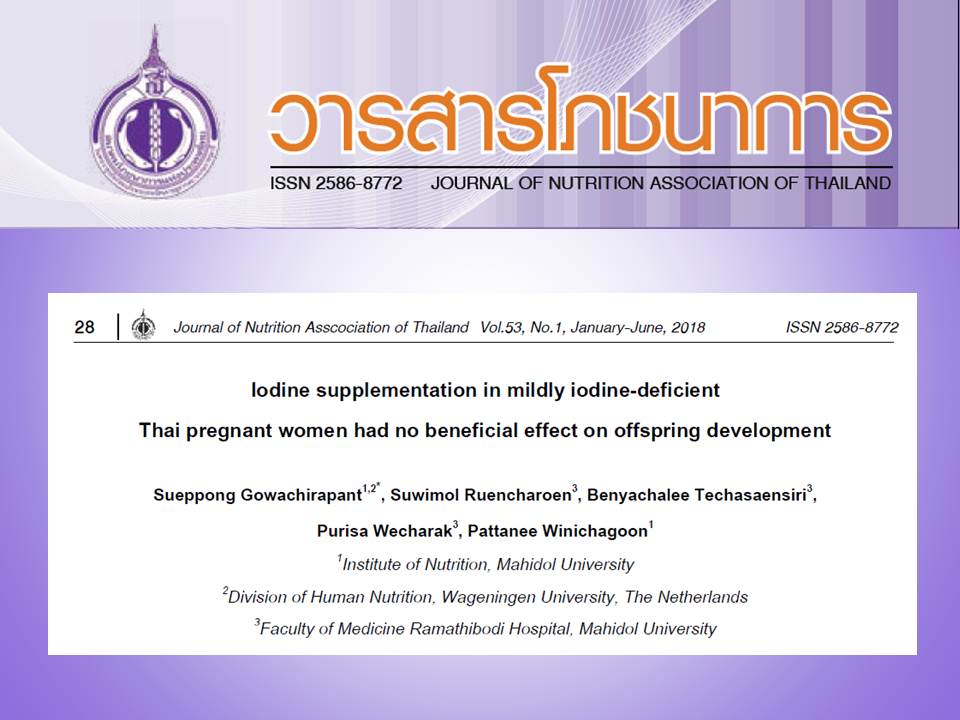Iodine supplementation in mildly iodine-deficient Thai pregnant women had no beneficial effect on offspring development
Keywords:
Iodine supplementation, Pregnant women, Child developmentAbstract
Iodine deficiency during pregnancy causes detrimental effects on the offspring’s cognitive function. Supplementation of iodine in pregnant women is recommended worldwide but its long-term consequence is questioned. The objective of this study is to determine the effects of daily 200 µg iodine supplementation in Thai pregnant women on maternal iodine status and neurological development of children. Mildly iodine-deficient (median urinary iodine concentration, mUIC<150 µg/L) pregnant women were randomized to receive daily 200 µg iodine or placebo until term. Maternal UIC and thyroid function were measured throughout the study. For child development test; Neonatal Behavioral Assessment Scale (NBAS) was performed at 6-week: Bayley Scales of Infant Development (BSID)-III was applied at 1 and 2 years: Wechsler Preschool and Primary Scale of Intelligence (WPPSI)-III was tested for 5-6 years children intelligence quotient (IQ). Audiogram of 5-6 years old children was obtained using Audiometer (GSI 61). Five hundred and fourteen pregnant women participated in the study (263 in control group and 251 in iodine group) at mean gestational age of 11 weeks. At 3rd trimester, two-fold significant increase of maternal mUIC in iodine group was reported (p<0.001) while mUIC in placebo group remained unchanged (p>0.05). Maternal thyroid function in both groups was stable and within normal range during the study. There were no significant differences in prevalence of maternal thyroid dysfunction between the two groups (p>0.05). Median UIC of children was higher than the recommendation (100 µg/L) and no significant differences were seen between the groups at every timepoints (p>0.05). All cognitive function scores in children did not differ significantly between groups (p>0.05). There were no significant differences in audiogram scores between the two groups (p>0.05). Supplementation of 200 µg iodine per day in mildly iodine-deficient Thai pregnant women improved maternal iodine intake but had no effect on long-term child neurodevelopment. However, iodine supplements for pregnant women should continue to be recommended until the impact of universal salt iodization (USI) program on Thai women is clarified.
References
2. WHO/UNICEF/ICCIDD. Assessment of iodine deficiency disorders and monitoring their elimination. 3rd ed. Geneva: WHO; 2007.
3. Winichagoon P. Thailand nutrition in transition: situation and challenges of maternal and child nutrition. Asia Pac J Clin Nutr. 2013;22(1):6-15.
4. Zimmermann MB, Delange F. Iodine supplementation in pregnant women in Europe: a review and recommendations. Eur J Clin Nutr. 2004;58:979-84.
5. Gowachirapant S, Jaiswal N, Melse-Boonstra A, Galetti V, Stinca S, Mackenzie I, et al. Effect of iodine supplementation in pregnant women on child neurodevelopment: a randomized, double-blind, placebo-controlled trial. Lancet Diabetes Endocrinol. 2017;5:853-63.
6. Pino S, Fang SL, Braverman LE. Ammonium persulfate: a safe alternative oxidizing reagent for measuring urinary iodine. Clin Chem. 1996;42:239-43.
7. Brazelton T, Nugent K. Neonatal Behavioral Assessment Scale. London, UK: Mac Keith Press; 1995.
8. Bayley N. Bayley Scales of Infant and Toddler Development. 3rd ed. San Antonio, TX: Pearson Education; 2006.
9. Ottem E. Confirmatory factor analysis of the WPPSI, WPPSI-R, and the WISC-R: evaluation of a model based on knowledge-dependent and processing-dependent subtests. J Psychoeduc Assess. 2003;21:3-15.
10. Gowachirapant S, Winichagoon P, Wyss L, Tong B, Baumgartner J, Melse-Boonstra A, et al. Urinary iodine concentrations indicate iodine deficiency in pregnant Thai women but iodine sufficiency in their school-aged children. J Nutr. 2009;139:1169-72.
11. Romano R, Jannini EA, Pepe M, Grimaldi A, Olivieri M, Spennati P, et al. The effects of iodoprophylaxis on thyroid size during pregnancy. Am J Obstet Gynecol. 1991;164:482-5.
12. Pedersen KM, Laurberg P, Iversen E, Knudsen PR, Gregersen HE, Rasmussen OS, et al. Amelioration of some pregnancy-associated variations in thyroid function by iodine supplementation. J Clin Endocrinol Metab. 1993;77:1078-83.
13. Liesenkotter KP, Gopel W, Bogner U, Stach B, Gruters A. Eariest prevention of endemic goiter by iodine supplementation during pregnancy. Eur J Endocrinol. 1996;134:443-8.
14. สุจิตต์ สาลีพันธ์, พูนศรี เลิศลักขณวงศ์, ณรงค์ สายวงศ์, สุทธาศินี จันทร์ใบเล็ก. คุณภาพเกลือเสริมไอโอดีนในครัวเรือน ปี2550. วารสารโภชนาการ. 2552;44:12-21.

Downloads
Published
How to Cite
Issue
Section
License
Upon acceptance of an article, copyright is belonging to the Nutrition Association of Thailand.


